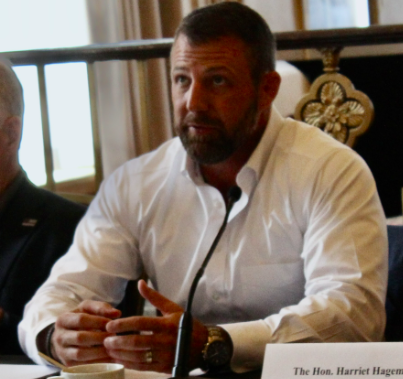U.S. Sen. Markwayne Mullin (R-OK), a tribal citizen of the Cherokee Nation and a member of the Senate Committee on Indian Affairs, drives illegally as he navigates Washington, D.C. in his Jeep.

During a Fox News interview on Sunday, Mullin said he doesn’t wear a seatbelt when driving in the nation’s capital because he is afraid of being carjacked.
“I don’t want to be stuck in my vehicle when I need to exit in a hurry, because I got a seatbelt around me and that — and I wear my seatbelt all the time,” he told Fox News host Brian Kilmeade.
Mullin was responding to President Donald Trump’s call to militarize Washington, D.C., by taking over the D.C. police force and sending in the National Guard.
Arguably, people need to be prudent about their safety anywhere these days. However, Trump’s and Mullin’s facts don’t add up.
Here are the facts:
At its peak in June 2023, Washington, D.C. recorded a carjacking rate of 20.6 per 100,000 residents. By June 2025, that rate had dropped sharply to 5.1 per 100,000 — a reduction of 75%, according to the Council on Criminal Justice.
Mullin lives in Westville, Oklahoma, near the Arkansas state line and about 80 miles from Tulsa. In 2023, the most recent year for which FBI statistics are available, there were 3,139 vehicle thefts in Tulsa — a rate of 765.4 per 100,000 residents.*
Does he wear his seatbelt in Tulsa?
* For Tulsa, Oklahoma, carjackings are often tracked under broader categories like "motor vehicle theft" or "robbery," and specific carjacking statistics at the municipal level are rarely made available.
More Stories Like This
Native News Weekly (August 25, 2024): D.C. BriefsMonday Morning (March 2, 2026): Articles You May Have Missed This Past Weekend
Native News Weekly (March 1, 2026): D.C. Briefs
Scope Narrowed, Report Withheld: Questions Mount Over Michigan Boarding School Study
Zuni Youth Enrichment Project Announces Family Engagement Night and Spring Break Youth Programming
Help us defend tribal sovereignty.
At Native News Online, our mission is rooted in telling the stories that strengthen sovereignty and uplift Indigenous voices — not just at year’s end, but every single day.
Because of your generosity last year, we were able to keep our reporters on the ground in tribal communities, at national gatherings and in the halls of Congress — covering the issues that matter most to Indian Country: sovereignty, culture, education, health and economic opportunity.
That support sustained us through a tough year in 2025. Now, as we look to the year ahead, we need your help right now to ensure warrior journalism remains strong — reporting that defends tribal sovereignty, amplifies Native truth, and holds power accountable.
 The stakes couldn't be higher. Your support keeps Native voices heard, Native stories told and Native sovereignty defended.
The stakes couldn't be higher. Your support keeps Native voices heard, Native stories told and Native sovereignty defended.
Stand with Warrior Journalism today.
Levi Rickert (Potawatomi), Editor & Publisher


